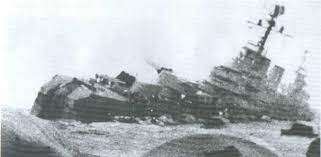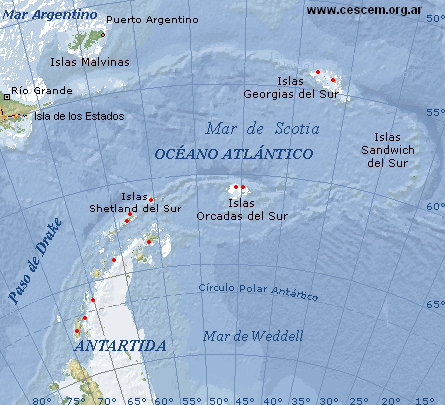LCFI Statement
The following document is based on the first international declaration against imperialism signed by Trotskyist political groups existing in both England (Socialist Fight) and Argentina (Bolshevik Militant Tendency). We updated that document in the light of the current conflicts, understanding that the defeats of imperialism in the 21st century mark a turn in favor of the imbalance of the inter-state struggle in favor of oppressed countries. On these defeats we refer to Lebanon (2006), to Crimea (2014), to Syria (2017) and especially from the war in the Ukraine (2022), when Russia imposed a limit on NATO’s Eastward expansion.

In the four decades that separate us from the Falklands War, this is an international declaration that defends the defeat of imperialism and the victory of the oppressed country, however, without capitulating to the bourgeoisie of the oppressed country. Let us not capitulate as those who yesterday took a position of the “third camp”, objectively pro-imperialist, nor yesterday to the military regime, nor today to the “national and popular” government of the Frente de Todos and even to Kirchnerism – nor spare criticism of the Alberto Fernández government and its agreement with the IMF. . in the South Atlantic.
The Argentine population feels stripped of its territory and its riches for centuries. . . The Falklands have three times more oil than the rest of the UK.
The Falklands War was a military adventure to save the Argentine dictatorship using a legitimate vindication of the anti-imperialist cause.
On March 30, 1982, 50,000 workers fought for 6 hours in the streets against the military dictatorship in Buenos Aires, Rosario, Neuquén, Mar del Plata, Tucumán and Mendoza. It was the largest wave of proletarian mass demonstrations during the entire military regime. The height of popular repudiation was the product of the political impasse in which the regime found itself. The growing economic crisis (bankruptcy of banks and companies, inflation and record unemployment, huge foreign debt,…) accentuated the internal division in the military government, provoked the coup within the coup that defeated Viola and led to the rise of Galtieri and undermined the support of the petty bourgeoisie for the regime. Besieged, the dictatorship resorted to an artifice of distraction provoking an external enemy and appropriated a secular aspiration of the Argentine people to divert popular discontent. This tactic, despite the immense internal crisis, gave life to the Argentine military regime.
The dictatorship did not believe in the British military reaction and opted for American intermediation. He thought that his role as an enforcer for Yankee imperialism, directly supporting the coup reaction and the CIA military in Bolivia and Nicaragua, would bear fruit and, feeling trapped by the current workers’ struggles, he tried to exploit the discontent over the occupation of the Falklands by the United Kingdom, believing that its imperialist masters Americans would be condescending, trying to avoid war, and pushing the conflict toward a negotiated solution that would be favorable to them.
They did not count that the inter-imperialist economic ties against the oppressed nations, “the imperialist class solidarity” between the US and the UK were stronger than the “gratitude” for the services of bootlickers provided by the Argentine semi-colonial bourgeoisie. In addition to the complicity of the United States and other Latin American enforcer dictatorships such as the Chilean Pinochet dictatorship, Britain also demanded that France cede the secret codes to deactivate the Exocet missiles it had sold to Argentina.
The dictatorship did not believe that the result of its occupation of the island would be a war and was not prepared for such a consequence. In turn, a military victory OF imperialism against an OPPRESSED COUNTRY that did not even prepare for the struggle overcame the crisis of the British government and the other oppressed peoples. . . This new imperialist offensive was carried out in England and the United States but had a pilot experience in the Chilean military dictatorship where it was baptised as neoliberalism.
Another fear of the dictatorship itself is that, in the midst of the crisis in which it finds itself immersed, a defeat of imperialism would not guarantee its survival either, and would also strengthen its worst enemy: the Argentine labouring masses. As Trotsky argued in his famous interview with the Argentine trade unionist Mateo Fosa, assuming a hypothetical war between Brazil, ruled by a dictatorship, and democratic England:
“If England were victorious, it would place another fascist in Rio de Janeiro and strengthen control over Brazil. If Brazil, on the other hand, were to emerge victorious, this would give a powerful boost to the national and democratic consciousness of the country and lead to the overthrow of the Vargas dictatorship. In fact, it is necessary to have nothing in mind to reduce world antagonisms and military conflicts to the struggle between fascism and democracy. You have to know how to distinguish exploiters, slavers and thieves behind any mask they wear!” .
“The anti-imperialist struggle is the key to liberation”, Interview of Leon Trotsky with Mateo Fossa, 23/09/1938
Similarly, by England winning, the Argentine dictatorship would fall in one way or another, as we have already said, the war gave it survival, but the world reaction was strengthened with the victory of imperialism, both in England and in Reagan’s USA, in Chile. Pinochet, in apartheid South Africa, including Peru, the South American country most involved in the conflict by militarily supporting Argentina with fighter jets, ships and medical equipment of the Peruvian Air Force, the right led the way with Alan Garcia and followed with Fujimori.
In England,
“Thatcher has recovered from a disastrous unpopularity in public opinion polls, due to the anti-worker attacks that led to the destruction of British jobs and factories, which would surely sweep her away in the next election. This ideological victory motivated her attack on miners in 1985, anti-union laws and the privatization of public services. And we must point out the terrible consequences of this policy for the British proletariat and the whole world, while many “left” apologists for imperialism have tried to obfuscate their betrayal by presenting as an achievement something quite secondary for the world working class such as the fall of Galtieri. The British working class was ideologically leaderless under the nationalist chauvinism of Labour’s Michael Foot and the other leaders. In 1981-82, Ronald Regan, president of the U.S., and Paul Volker, president of the Fed, the U.S. central bank, defeated the flight controllers’ strike (from PATCO). While the Falklands War was at its height, Reagan launched a ruthless offensive against the American working class, which set the standard for the offensive of all capitalists against their own working classes around the world. All this prepared the coronation of imperialism with the historic world defeat suffered by the planetary working class with the overthrow of the Soviet Union.” .
Ret Marut, “FUA is the tactic, Permanent Revolution is the current strategy in the face of imperialist wars in the semi-colonial world, Socialist Fight #8, Winter 2011/2012

This victory of imperialism in the only direct military confrontation against a semi-colonial South American country after World War II was a decisive battle of the planetary class war. The outcome of the war did not necessarily have to be this, since the outcome of the Vietnam War was not as expected by imperialism and this altered imperialism’s strategic control over Asia, forcing it to seek a heterodox alliance with the Chinese workers’ state against the USSR.
As portrayed in “The Iron Lady” (2011), Phyllida LLoyd’s film , after the victory over Argentina, the triumphant Conservative prime minister addresses the British parliament to the Labour opposition: “This is a day to put aside differences, keep your head up and be proud to be British.”
The Labour Party follows Thatcher’s guidelines. The left wing of Labour also despised conflict against its own imperialist bourgeoisie and was proud of Argentina’s defeat. These elements drove the recovery of Thatcher’s popularity, the momentary reinvigoration of the British bourgeoisie, the increase in extortion of the proletariat (Poll Tax) and the triumphant reaction on the planet, in addition to highlighting the film through continuous consecutive comments from different characters:
“This rewards everything, their ratings skyrocket, from the most hated prime minister of all time to the beloved of the nation. The world was at her feet and Britain was working again. The business grows, the profits, the profits, the profits, Maggie’s millionaires, the Berlin Wall has fallen.”
In Argentina, hating the dictatorship, the working population took to the streets en masse to protest, especially against Britain, and to reclaim the archipelago. Because of this, one hundred thousand people volunteered to fight for the anti-imperialist cause. But it should be emphasised. For fear of the population, the dictatorship sabotaged the war effort of the Argentina itself, tortured the soldiers and sent them to die deliberately of cold and hunger, refused to expropriate the Bank of London and the British multinationals and ignored the foreign debt to England. More than the disproportion of forces was the political clumsiness of the dictatorship in the anti-imperialist struggle that forced Argentina to surrender on June 14, after battles that claimed the lives of 649 Argentines and 255 British.
Frustration at the defeat continued to take its toll, with ex-combatant centres pointing out that since the end of the war, more than 450 ex-combatants committed suicide because they were in a deep state of depression. This number is higher than the number of soldiers killed in battles on the islands, which were a total of 326; another 323 were killed when a British submarine torpedoed the cruiser General Belgrano. But Argentina’s defeat did not end there, and British imperialism continued to advance in a low-intensity offensive for the past 30 years.
The war is over, but the imperialist offensive in the Falklands continues
In 1986, the United Kingdom first claimed a fishing zone around the Falklands, guaranteeing the right to exercise its sovereignty from the coast up to 200 nautical miles, including the right to the bed and subsoil of the underwater platform. In 1993, the United Kingdom also proclaimed a 200-nautical-mile maritime zone around South Georgia and the South Sandwich Islands. The kelpers are an auxiliary force of the British garrison, as are the Zionist settlers of the Gaza Strip are of the Israeli army, they have the spoils made against Argentina after 1982, a loot that already benefits the second generation of kelpers.
British imperialism, a component of the Anglo-Saxon bloc with the US, formed a cordon linking Asunción, Santa Elena, Tristan de Cunha and Malvinas. This cordon serves the immediate and geostrategic interests of England, which are overvalued in times like the current one, of economic recession and overheating of oil prices amid the new warmongering escalation in Africa and the Middle East. In addition to the disputed oil, there is fishing – including the important resource of krill – the possibility of transpolar flights and the fastest route to other members of the Anglo-Saxon bloc made up of oceanic countries (Australia and New Zealand) and Antarctica, as a strategic reserve for the immediate future, being the Antarctic sector on which the Malvinas is projected the most interesting for the facilities for economic viability.
Geostrategic interests in this area of the globe are also highlighted, such as the control of air and maritime traffic in the South Atlantic, that is, between South America and Africa, projecting into the Antarctic seas, the control of the interoceanic route the passages between the Atlantic and the Pacific, the communication with the Indian Ocean from the South Atlantic, being important for England the maritime lines that lead to Australia, fundamental for the logistics of the twin creation of NATO in the Pacific, the AUKUS created in 2021.
Malvinas and Oil
The UK can earn up to US$176 million – as early as 2012 — from taxes levied on companies exploring for gas and oil in the Falkland Islands area. According to The Telegraph, the calculation, which was made by consultancy Edison Investment, estimates that if the four fields currently being explored can be explored by oil companies, that would be the benefit to Britain.
Loligo alone, the largest of these wells, has a potential of more than 4.7 billion barrels of oil. This figure stands out if one takes into account that, in the North Sea, the largest deposit discovered in the last 11 years only contains a total of 300 million barrels.
Added to this is the calculation that the Sea Lion field, the most developed exploration in the region, will produce about 448 million barrels in the next 20 years.
Peronism, incapable of breaking the Anglo-Saxon blockade and less of returning the Malvinas
While imperialism parades with ease, the government of Alberto Fernández does not attack British interests in Argentina, like British property in Patagonia, does not repudiate bonds from the debt with London, does not confiscate Shell, does not investigate the interests of the British crown itself in the lands of southern Argentina.
Imperialism bets on the survival of the Anglo-Saxon-Zionist bloc that historically had its eyes on controlling the Persian Gulf, from where the sap that feeds the Eurasian core comes out, especially its industrial heart (China) and is the gateway to most of Asia (Russia). in the Persian Gulf, the configuration of the twenty-first century world is decided in both the continental northern hemisphere and the maritime southern hemisphere. The importance of the Falklands today is similar to that of the isthmus of Central America, with the Panama Canal. Today with the new cold war the possibility of the Anglo-Saxon-Zionist bloc controlling the Persian Gulf is very limited which reinforces that they will not back down on what they already control in the islands of the South Atlantic.

Today, financial-speculative capital tries to reassert itself with a material base by controlling strategic extractive resources. They predict that the predominantly financial-speculative era is ending (the phenomenon of running out of betting chips in the global casino) and that it is necessary to accumulate again, therefore, they need to control strategic resources, especially extractive ones, of the “real economy” to guarantee its reconversion to match that which today manifests itself in the economic development obtained by the Chinese industrial bourgeoisie and the associated techno-bureaucracy. This sector of the world bourgeoisie can already be considered a new player, possessing important chips in the extreme south of the American continent.
China supported on Tuesday, February 8, 2022, Argentine sovereignty over the Falkland Islands through a statement on the website of the spokesman of the Asian embassy in the United Kingdom. https://www.telesurtv.net/news/china-apoyo-dialogo-argentina-reino-unido-malvinas-20220208-0009.html
To that we must add the growing economic role of China in Argentina. the Chinese state holding COFCO that by 2021 was already the second agro-export group in Argentina. https://www.argenports.com.ar/nota/cargill-cofco-y-viterra-los-que-mas-exportaron-granos-y-subproductos-en-2021. Also in 2022 The Chinese mining company Zijin Mining advanced in Catamarca oriented to the exploitation of Lithium (https://agendarweb.com.ar/2022/03/21/la-minera-china-zijin-mining-avanza-en-catamarca-y-se-reune-con-el-presidente/). We must add, for example, Chinese interests in transport infrastructure such as the Belgrano Freight Railway. https://www.elagrario.com/actualidad-argentina-ratifico-el-acuerdo-con-china-para-modernizar-el-belgrano-cargas-43223.html.
In short, in the last 10 years, Chinese economic interests have grown throughout the national territory oriented above all to the expansion of the country’s productive base in complementary areas of those in China itself, aimed at making Argentina – or the Argenchina – an external and overseas economic province of China. Also, at the mining level China does not stop growing in Argentina.” in San Juan, the Chinese company Shandong Gold, owner of 50% of the operation in the Veladero mine together with the Canadian Barrick Gold, committed $ 145.5 million to extend the useful life of the deposit until 2030, which will allow the recovery of 1.2 million ounces of gold. In 2017, the Chinese acquired half of Veladero for $960 million. Before the pandemic, Shandong Gold had planned to create 1,100 jobs and his plans also show comparing Pascua Lama to Barrick.
In Jujuy, Ganfeng Lithium disbursed $160 million to Vancouver-based Lithium Americas for 50% of the Caucharí-Olaroz lithium project, currently under construction. The Chinese company agreed on a financing schedule, which includes an investment of up to $400 million.
In La Rioja, London-based ECR Minerals sold its Argentine subsidiary Ochre Mining to China’s Hanaq Argentina, which also specializes in lithium but at the same time controls the Sierra de Las Minas gold project. https://argenchina.org/radiografia-de-las-inversiones-chinas-en-energia-argentina/
In Entre Ríos, the National Corporation of Technical Import and Export of China (CNTIC) is carrying out an investment of US $ 200 million to build 50 km of gas pipelines, a high voltage line of 132 kw and an extension of optical fiber, which will allow to conclude the energy closure of the north of Entre Ríos. https://argenchina.org/radiografia-de-las-inversiones-chinas-en-energia-argentina/
This expansion of the productive base – especially in the provinces of the interior of the country – hand in hand with the Chinese expansion brings a certain economic dynamization that constitutes an alternative to the financialization promoted by imperialism. But we must bear in mind that Chinese investments aim to make Argentina as we said an external economic province of China Faced with this, the national demands that may emerge – such as those that point to a development of the productive base rather than as a complement of China – can be framed as progressive in the hands of the working class but taking into account that China does not constitute an imperialist center.
The “third world”, the capitalist unity of Latin America and the “emerging” semi-colonial countries are farces, none of the other BRICS effectively has economic independence from imperialism. In relation to the Anglo-Saxon-Zionist bloc. British imperialism needs to constantly proclaim that it won in 1982 to negotiate with the geostrategic advantages that give it control of the key to the South Seas, in addition to enjoying the economic resources to negotiate on better terms within the Anglo-Saxon-Zionist bloc.
In future it is possible for nationalism in Argentina to be linked to the expansion of the Russian-Chinese pole and within that junction include relying on the Russo-Chinese pole itself in the face of the Malvinas question. That would be progressive since it makes the claims of the oppressed nation like Argentina, but we must not lose sight of the fact that this progressiveness has the limit that both Russia and China are capitalists although with a growing state capitalism.
The contradictions and betrayals of the pseudo-Trotskyist left confronted with the Falklands War
Pseudo-Trotskyist currents such as the Morenoist LIT, claimed to stand in the military camp of the Argentine dictatorship against imperialism in the Falklands War. But in Libya, Syria and Ukraine, in the name of the struggle against dictatorship, they joined the imperialist war propaganda, taking the imperialist camp against the current oppressed nations under attack.
Recently that was reinforced in relation to the NATO-Russia conflict in Ukraine with which they favor imperialism. These parties, like Morenoism in the 80s, demonstrate that their anti-imperialism is nothing more than Latin American nationalism or patriotism; a “feeling” that, despite being progressive, being the nationalism of the oppressed nation, has nothing to do with the anti-imperialism and anti-colonialism of Marx, Lenin and Trotsky. Today the matter is worse, the heirs of the LIT and pseudo-Trotskyism in general are all the more adapted to public opinion manufactured by imperialism that they cannot even be criticized for any nationalism as we did with the LIT in the 1980s.
The revisionist currents ICL-FI, IMT, CWI and Lambertism originating in the United States, England and France have taken a defeatist, third-camp position, a position that objectively serves their own bourgeoisies against the oppressed nation. These parties capitulated to their own imperialist bourgeoisie, under the fallacious justification of supporting the “self-determination of the Kelpers”, “fighting against the diversionary maneuver of the bloodthirsty Argentine dictatorship”, or because supposedly “Argentine sovereignty was not at stake”.
For the Trotskyists the only principled position must be the struggle for the defeat of imperialism, the distrust in the military junta, for the armament of all the people, the expropriation of imperialist capital in Argentina, the Bank of London and the ignorance of all the Argentine external debt with England. Today, the government of Alberto Fernández, which with its “diplomatic” tactics is objectively more servile and impotent than Galtieri was, while imperialism advances in its colonization of the South Atlantic and Antarctica from the Falklands. Revolutionaries must claim the relevance of the anti-imperialist struggle for the Malvinas, Haiti, Libya, Iraq, Syria, Afghanistan, Brazil, Bolivia, Venezuela, Kazakhstan, Ukraine. We must fight in a united front with all the political forces that are resolute for the expulsion of imperialism. At the same time, we must also denounce the collaborationism of the semi-colonial bourgeois governments that pave the way for recolonization. In this struggle, revolutionaries do not feed illusions in their bourgeois allies and demand internationalist and workers’ unity to defeat the imperialist pirates all over the world.

